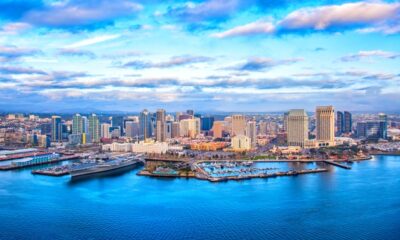Health
Denmark’s Economic Giants Face Uncertain Future Amid Job Cuts

Denmark’s corporate landscape, once dominated by the unassailable successes of companies like Novo Nordisk A/S and Orsted A/S, is now facing significant challenges. Novo Nordisk, a leading insulin manufacturer, recently announced plans to cut 9,000 jobs, with more than half of those in Denmark, following a decline in its competitive edge in the U.S. obesity market against Eli Lilly & Co. Meanwhile, Orsted, renowned as the world’s largest offshore wind developer, is grappling with rising costs and project cancellations, raising concerns about the viability of Denmark’s green energy ambitions.
These developments have sent shockwaves through Denmark’s economy, impacting not just investors but also government ministries and households. The decline in consumer confidence could hinder domestic spending and damage the investment culture that has flourished in recent years. Economists are warning of a potential downturn, with some likening the situation to Finland’s economic struggles following its overreliance on Nokia.
Las Olsen, chief economist at Danske Bank A/S, emphasized the precarious timing of these setbacks, noting that “this very bleak sentiment could easily get worse,” potentially leading to reduced consumption across the country.
In Kalundborg, where Novo Nordisk has its main production site, the impact of these job cuts is palpable. Local businesses that depend on the company are already feeling the effects, as consumer spending habits shift. Michael Rasmussen, who operates a supermarket nearby, remarked, “Right now, it’s really taking a psychological toll,” highlighting the immediate effects on purchasing decisions for larger items like kitchens and cars.
Denmark’s economic landscape has changed dramatically over the past few decades. While the revenues of the country’s ten largest companies represented about 20% of its GDP in the 1980s, that figure has ballooned to approximately 45% today, according to Martin Jes Iversen, a business history researcher at the Copenhagen Business School. This transformation has positioned Denmark as one of the richest countries globally, measured by GDP per capita.
Historian Jeppe Nevers noted that the success of these multinational companies has become ingrained in the Danish identity, reinforcing the perception that their prosperity hinges on global business success. Yet, the vulnerabilities of this dependency are now becoming evident.
Despite having a fundamentally robust and diverse economy, the struggles of Novo and Orsted could undermine government spending and affect Denmark’s self-image as an economic powerhouse.
In late August 2023, Danish lawmakers presented a budget that appeared to celebrate the nation’s economic achievements. The finance minister touted tax cuts and increased welfare funding made possible by high employment and substantial corporate tax revenues, with Novo contributing an estimated 15% of this income.
The success of Ozempic and Wegovy had previously driven GDP growth significantly above that of other European nations, leading to revised revenue forecasts and increased government spending. In fact, Novo was responsible for a remarkable 20% of Denmark’s private employment growth last year, bolstering various sectors and contributing to record grants for research initiatives.
Despite these achievements, the company’s recent challenges highlight the risks posed by its substantial economic influence. A report from a key ministry referenced Novo thirty-one times in its assessment of Denmark’s economic outlook, indicating just how central the firm has become to national economic performance.
There are fears that Novo may be following a trajectory similar to that of Nokia Oyj, which once fueled Finland’s economic boom before its decline contributed to a broader economic downturn. Jyrki Ali-Yrkko, a researcher at the Finnish Economy Research Institute, pointed out that Novo might play an even more significant role in Denmark’s economy, accounting for about 5% of its GDP.
As Novo implements job cuts alongside a reorganization to focus on high-impact research and development, concerns remain about the broader implications for Denmark’s economy. Analysts predict that unemployment could rise by approximately 0.2% percentage points, although many of those laid off are expected to find new positions.
While Orsted does not have the same level of impact on Denmark’s economy as Novo, its ongoing crisis threatens the country’s reputation as a leader in renewable energy. The company has encountered a series of setbacks in the U.S. market, including project cancellations and substantial write-downs, prompting it to raise $9.4 billion in capital—its largest fundraising effort in over a decade.
The challenges faced by Orsted have raised questions about Denmark’s energy strategy. The government is now considering alternative energy sources, including a review of its long-standing ban on nuclear energy, as public sentiment shifts regarding the feasibility of relying solely on wind power.
In Kalundborg, the atmosphere remains cautiously optimistic despite the uncertainty. Local business owners, like Shaun Gamble of Costa Kalundborg Kaffe, find themselves in a state of resilience. “It’s not the news you want to hear,” he said, reflecting on Novo‘s job cuts, yet he remains hopeful about the future.
Even as the challenges mount for Denmark’s corporate giants, the community continues to adapt and invest, with ongoing construction projects and plans for new infrastructure indicating a determination to thrive despite the uncertainties ahead.
As Denmark navigates this turbulent landscape, the interplay between its corporate successes and the broader economic implications will be closely watched by both local and international observers.
-

 World3 months ago
World3 months agoScientists Unearth Ancient Antarctic Ice to Unlock Climate Secrets
-

 Entertainment4 months ago
Entertainment4 months agoTrump and McCormick to Announce $70 Billion Energy Investments
-

 Lifestyle3 months ago
Lifestyle3 months agoTransLink Launches Food Truck Program to Boost Revenue in Vancouver
-

 Science4 months ago
Science4 months agoFour Astronauts Return to Earth After International Space Station Mission
-

 Technology2 months ago
Technology2 months agoApple Notes Enhances Functionality with Markdown Support in macOS 26
-

 Top Stories2 weeks ago
Top Stories2 weeks agoUrgent Update: Fatal Crash on Highway 99 Claims Life of Pitt Meadows Man
-

 Sports3 months ago
Sports3 months agoSearch Underway for Missing Hunter Amid Hokkaido Bear Emergency
-

 Politics3 months ago
Politics3 months agoUkrainian Tennis Star Elina Svitolina Faces Death Threats Online
-

 Technology3 months ago
Technology3 months agoFrosthaven Launches Early Access on July 31, 2025
-

 Politics3 months ago
Politics3 months agoCarney Engages First Nations Leaders at Development Law Summit
-

 Entertainment3 months ago
Entertainment3 months agoCalgary Theatre Troupe Revives Magic at Winnipeg Fringe Festival
-

 Politics2 weeks ago
Politics2 weeks agoShutdown Reflects Democratic Struggles Amid Economic Concerns





















